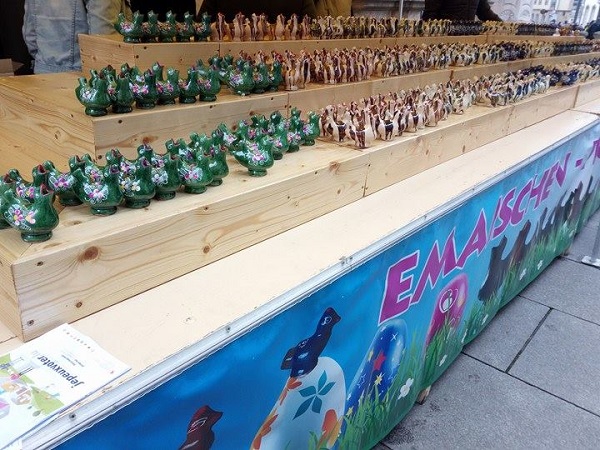 Éimaischen 2017 in Luxembourg City;
Credit: Jazmin Campbell
Éimaischen 2017 in Luxembourg City;
Credit: Jazmin Campbell
A traditionally Catholic country, Luxembourg celebrates Easter much like any other Christian country, paired with a few unique traditions of its own.
Easter is one of the oldest and most important festivals of the Christian Church. Celebrated on Easter Sunday, which falls this year on 17 April, this holiday marks the resurrection of Jesus Christ on the third day after his crucifixion. Like several other religious holidays in Luxembourg and beyond, however, Easter has become increasingly commercialised.
Nevertheless, many practising Christians in Luxembourg attend mass on Holy Thursday (Gréngendonneschden), Good Friday (Karfreiden) and Holy Saturday (Karsamsden), as well as the Resurrection Matins on the morning of Easter Sunday (Ouschtersonnden). Moreover, Catholics observing Good Friday will avoid eating meat or poultry on this day; fish is allowed.
As well as a religious holiday, Easter is a significant family celebration in Luxembourg, during which children paint boiled eggs together with their families and eagerly await treats from the Easter Bunny (Ouschterhues). The latter hides these eggs, which are often replaced nowadays by chocolate eggs, for the children to find as part of a traditional Easter egg hunt. Before eating their eggs, children traditionally play a game of egg tapping (Técken), during which they tap their painted eggs againt one another. The child whose egg remains intact is crowned the winner.
Another Luxembourgish tradition this time of year is Klibberen, during which children take to the streets with their ratchet (Klibber), a small wooden percussion instrument, replacing the ringing of church bells and singing the ratchet song (Klibberlidd) from Maundy Thursday to Easter Sunday. The children are typically rewarded with Easter eggs and money by the locals on Easter Sunday.
As Easter Sunday approaches, women who received a pretzel from their male sweetheart on Pretzel Sunday (Bretzelsonndeg), celebrated this year on 27 March, should remember to return the favour with an Easter egg (or an empty basket if she is not interested in his affections). Note that in leap years, the roles are reversed, with women offering men a pretzel and men later having to choose between an egg or an empty basket.
Another popular way to celebrate Easter in Luxembourg is a trip to the traditional Éimaischen (Feast of Emmaus) markets in Luxembourg-Ville or Nospelt (in the municipality of Kehlen) on Easter Monday. These markets are the exclusive place to admire and purchase Péckvillercher, small terracotta whistles in the shape of birds.
A more local Easter tradition can be found in Vianden, in Luxembourg's Ardennes region: Jaudes. This centuries-old tradition is celebrated on Good Friday and the name refers to both the festival and the dog rose (Rosa canina) plant. According to tradition, after preparing a bouquet of wild rose thorns or paper flowers, boys in Vianden would go into their neighbourhood at midday to burn it. The medieval tradition is inspired by Judas Iscariot, one of the original Twelve Apostles of Jesus Christ; it showed the people's disapproval of Judas' betrayal of Jesus.
Since Easter is a school holiday, several Luxembourgish families may also choose to travel abroad during this period.








